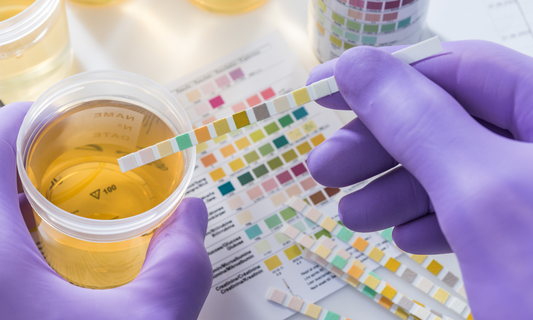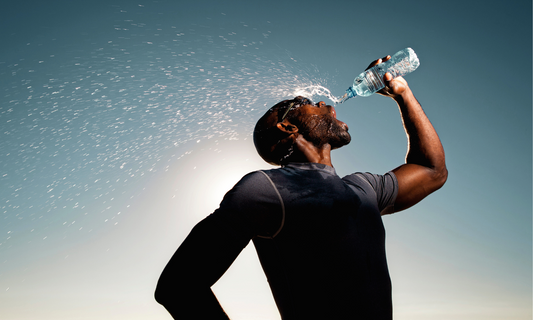How to rehydrate quickly?

Hydration is key to the proper functioning of our bodies. It helps with blood circulation and ensures optimal cognitive functions, for example. But how can you rehydrate quickly when you're dehydrated? That's what we'll explore in this article.
1. Why is it important to rehydrate quickly?
Since water is essential for the body to function, dehydration can cause several uncomfortable symptoms. The impact on your health will be primarily physical, with fatigue, cramps, and dry skin, and then on your brain, with decreased concentration and confusion. Finally, on the kidney side, there is a risk of kidney stones and even kidney failure if dehydration persists.
The time required for rehydration depends on the severity of the dehydration. Mild dehydration can take a few hours, with regular hydration. More severe dehydration can take a full day, requiring electrolyte drinks, for example. In more severe cases, intravenous rehydration is necessary and can take several days.
2. What are the signs of dehydration?

Signs and symptoms of dehydration depend on the age of the person affected.
In adults, these include thirst, dry mouth, headache, dark urine, and fatigue.
Children who are more vulnerable to water deprivation may experience decreased urine production, dry mouth and lips, more frequent crying but with few tears, rapid breathing, sunken eyes, and cold extremities if the situation becomes critical.
Finally, for older adults, the sensation of thirst is often altered because they lose the desire to drink with age. Symptoms they may experience include fatigue, drowsiness, confusion, dizziness, and infrequent dark urine.
3. What is the best drink to hydrate?
To effectively rehydrate, simply drinking water isn't enough. It's essential to replenish mineral stores such as sodium, potassium, and magnesium. Dehydration is not only a loss of fluid but also an electrolyte loss! Here are the main options available for rehydration:
Water alone is the most logical and accessible option, but it does not contain enough electrolytes.
Diluted fruit juices provide potassium and glucose, but their sugar content should be monitored.
Electrolyte drinks are particularly effective because they contain water and minerals.
Oral rehydration solutions, recommended by health professionals, are the most effective in combating dehydration but are primarily intended for young children.
Each electrolyte plays a key role in hydration: sodium helps retain water, potassium regulates fluid balance, and magnesium supports muscle and nerve function.

At Hydratis, we've designed tablets composed of electrolytes and a small dose of sugar that promote your body's absorption of water. They're particularly useful during intense physical activity or during periods of intense heat, but also for anyone who has difficulty hydrating or is looking to hydrate effectively. They can be consumed daily to optimize your hydration.
4. How to rehydrate properly depending on the situation?
The various solutions for rehydration vary depending on the cause of dehydration. Some situations require simple fluid intake, while others involve specific electrolyte rebalancing to compensate for mineral losses and maintain proper cellular function.
4.1 In case of gastroenteritis or fever
During gastroenteritis, diarrhea and vomiting lead to a rapid loss of water and electrolytes (sodium, potassium, chloride). These losses are particularly critical in children and infants, as their small body mass makes them more vulnerable to dehydration.
In infants and young children, it is essential to administer oral rehydration solutions (ORS), recommended by the WHO. These solutions contain a precise mixture of glucose and electrolytes that allow for effective rehydration via sodium-glucose transport in the intestine.
In adults, except in cases of severe dehydration, ORS is not always necessary. An electrolyte drink or salty broth may be sufficient to replace fluid and mineral losses.
Fever causes excessive sweating, increasing the risk of dehydration. Water alone may be sufficient for mild fever, but if sweating is significant or nutrition is limited, a mineral-containing drink (broth, diluted fruit juice, electrolyte drink) may be beneficial.
4.2 After physical exertion or in case of extreme heat
Physical exercise and heat increase sweating, leading to a loss of water and minerals. The composition of sweat varies among individuals, but it typically contains sodium, potassium, magnesium, and chloride.
If the effort is short, less than an hour and of low intensity, water alone is often sufficient, especially if the diet then compensates for mineral losses. If this is not the case, then drinks containing electrolytes are worth prioritizing.
If the effort lasts more than an hour or is intense, a hypotonic or isotonic drink is recommended. These drinks provide sodium and varying amounts of carbohydrates to optimize water absorption, prevent muscle cramps, and maintain energy.

In extreme heat, the body experiences continuous water loss through sweating, even without physical activity. It is therefore important to drink small amounts of water regularly and to choose drinks rich in electrolytes if sweating is significant. Mineral waters rich in sodium, broths, and hypotonic solutions composed of electrolytes are excellent options.
4.3 For babies, the elderly and pregnant women
These types of people are more susceptible to dehydration and require adequate hydration.
In babies, their high proportion of body water (80% water at birth) makes them more vulnerable to dehydration, especially in cases of fever or diarrhea. So don't forget to consult a healthcare professional! At the first signs (infrequent urination, crying without tears, sunken fontanelle), it is crucial to administer an oral rehydration solution (ORS). They should not be given large quantities of plain water, as this could cause a dilution of blood sodium (hyponatremia).
Pregnant women's water needs increase to compensate for the expanding blood volume and support fetal development. It is recommended to drink 1.8 to 2.5 liters of water per day, increasing intake during heat or physical activity. In cases of frequent nausea or vomiting, electrolyte-rich hydration may be necessary to avoid mineral imbalances.
Elderly people are less thirsty and are therefore at particular risk of dehydration, which can worsen conditions such as constipation, urinary tract infections, or mental confusion. It is essential to regularly offer them water or hydrating drinks. Incorporating water-rich foods (fruits, vegetables, soups) can also improve their fluid status.
5. How to make a homemade hydration solution?
Here's a quick and effective recipe so you can make your own drinks to stay optimally hydrated.
Here are the ingredients:
- 1L of water
- 10 to 30g of sugar (according to your taste)
- ½ teaspoon of salt
- Lemon juice
Simply mix all the ingredients together and keep your drink chilled. Consume within 24 hours.
6. When should you seek medical help?
Medical attention is essential if the person loses consciousness, does not produce urine for more than 8 hours, or shows symptoms of severe dehydration.
In babies, it's a cause for concern if they don't cry, refuse to drink, or don't urinate at least three times a day. A consultation is also necessary in cases of high fever, diarrhea, or persistent vomiting. In all cases, we recommend consulting a healthcare professional.
Depending on the cause and severity of dehydration, it is essential to adopt the hydration solution best suited to your needs, whether it is pure water, electrolyte drinks, oral rehydration solutions or a water-rich diet.
Good prevention requires regular hydration, adapted to weather conditions, physical activity, and each individual's specific needs. By remaining alert to the signs of dehydration, it's possible to act quickly and avoid complications.
Bibliography











